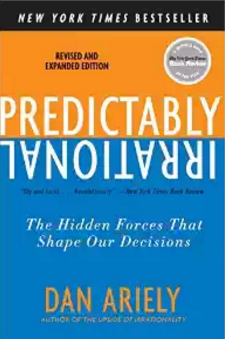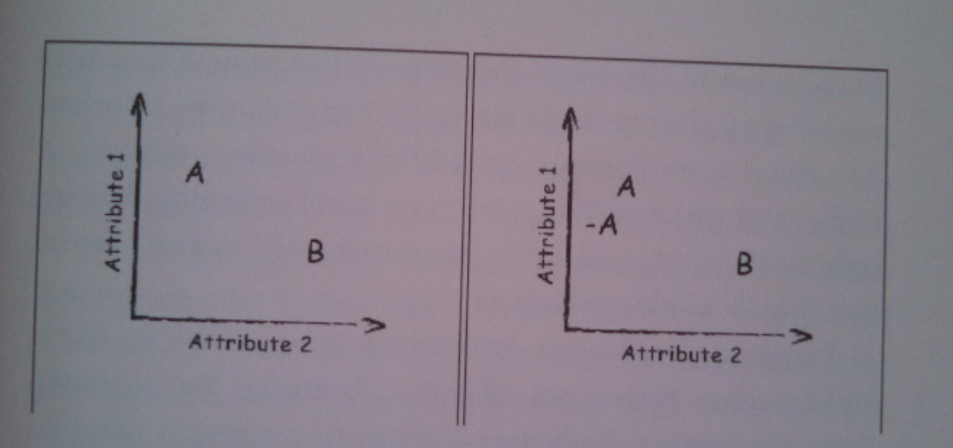 Predictably Irrational, by Dan Ariely, is one of the best books I have ever read.
Predictably Irrational, by Dan Ariely, is one of the best books I have ever read.
When you want to better understand what motivates you, and the people around you, you have to check out this book
Written by MIT’s Professor of Behavioral Economics, Predictably Irrational examines how we make daily decisions and what actually influences our thought process (Hint: it isn’t logic or reason).
The book also explores how major corporations, marketers, and salesmen are all able to exploit our “predictably irrational” behavior for personal profit.
Below are three fascinating facts that this book exposes.
What Causes You To Like Your Favorite Things?

Take a moment to think about these questions:
- Why do you do shop at specific stores?
- Why do you have a favorite bar or coffee shop?
- Why do you visit certain websites on a daily basis?
- Why do you always order the same pizza toppings no matter where you’re at?
Once you find one thing that you like, or that is at least tolerable, you’ll keep going back and doing it again and again. People create “anchors,” which we use as reference points for all the decisions we make.
If you know pepperoni pizza tastes good, it’s highly unlikely that you’ll go out on a limb and order squid, clam, and shrimp as toppings the next time you go to Domino’s.
While the average person is unaware of how anchoring works, huge corporations are masters of controlling behaviors through the use of reference points.
If a company like Starbucks can get you to try their coffee, and like it, they can easily turn you into a “regular” and have your business for life.
Likewise, companies can create anchors for different product prices. They can set the cost of a new product as high as they’d like and, without a reference point, buyers will blindly accept.
A classic case of this was the introduction of “gourmet coffee.” When Starbucks first started to introduce fancy blends of coffee, the general population was unaware of what a macchiato or latte was.
People knew regular coffee, but the idea of ordering a “Venti latte” was completely foreign. Because of this, Starbucks was able to set their own prices without ever having to worry about being compared to any other brand.
Gas stations and convenience stores sold “coffee” (which cost about $0.75) but Starbucks sold frappuccinos, americanos, mochas, and espressos (costing $4 – $6). When you control reference point you control how much people will pay.
Why Can Direct Sales Trump Building Customer Relations?
When I started building lots of websites, I noticed something interesting.
Every website that indirectly sold a product (and focused on giving away “how to” information) had low profits and lots of people asking for free advice.
In comparison, all of my sites that focused on directly selling something (with very little free information) had high sales and virtually no people asking me questions.
What caused this?
In Predictably Irrational, Dan Ariely explains that relationships are built on one of two factors: social transactions or marketplace transactions.
Social transactions occur when we do nice things for people we like, while marketplace transactions are strictly based on money. When you try crossing the two, things seldom go well.
Ariely points out that you can do something socially (like going on a date) or you could do something by marketplace values (like paying for sex), but you can’t combine the two (i.e. Go on a date, have sex, and then offer the girl $50).
This also crosses over into the world of business:
No matter how many cookies, slogans, and tokens of friendship a bank provides, one violation of social exchange means that customer is back to the marketplace exchange.
Ariely goes on to note that in businesses where you can’t always “play nice:”
You might not want to waste money in the first place on making your company the fuzzy feel-good choice. In that case, stick to a simple value proposition: state what you give and what you expect in return. Since you’re not setting up social norms or expectations, you also can’t violate any – after all, it’s just business.
When people see your business as a friend, they expect friendly free services (like you answering their long-winded emails). When they see you as a business, they only expect to get something of value by giving you money.
How Companies Use The Illusion Of Value To Makes Sales

(Diagram of the “A, A-, B” trick)
Smart companies, and salesmen, are able to engineer “incredible bargains” which most people simply can’t resist. They do this with something called the “A, A-, B” offer. Here’s how it works:
- A: Product they want to sell you
- A-: Lesser product that makes product “A” seem better
- B: “Decoy” product that you have zero interest in buying
Say that you want to join a gym and lift weights. The place you are looking at might have three membership options available:

One of the options (treadmills) is something you don’t want, the other (weight room) is what you were looking for and nothing else, while the third (weights, pool, and treadmills) is everything you want and more! As soon as most people see deal number three, they’ll sign up. Often without even bothering to look at what the competition might have to offer.
Because you were given different choices to look at, the company was able to position the product that they wanted you to buy (in this case a complete gym membership) as an incredible value.
They were also able to make their own products into the “competition,” keeping you from even thinking about investigating another brand. If the gym only offered one tier of membership, you’d compare them with other local gyms. But by making their pricing options “compete against themselves” you’re only thinking about what this one company has to offer.
All major businesses (from the phone company to your insurance agent) understand the importance of the “A, A-, B” tactic. All of them offer different pricing options and service plans in order to create the illusion of better value and to keep you from comparing other brands.
Conclusion
Predictably Irrational is a fantastic book and an incredible eye-opener into why we behave in the manners that we do.
Whether you’re interested in business, psychology, or developing a better understanding of yourself, Predictably Irrational can help you immensely.
Click Here To Order
P.S. This is one of the best books on human behavior ever written. If you want to understand what makes people tick, you need to read this.